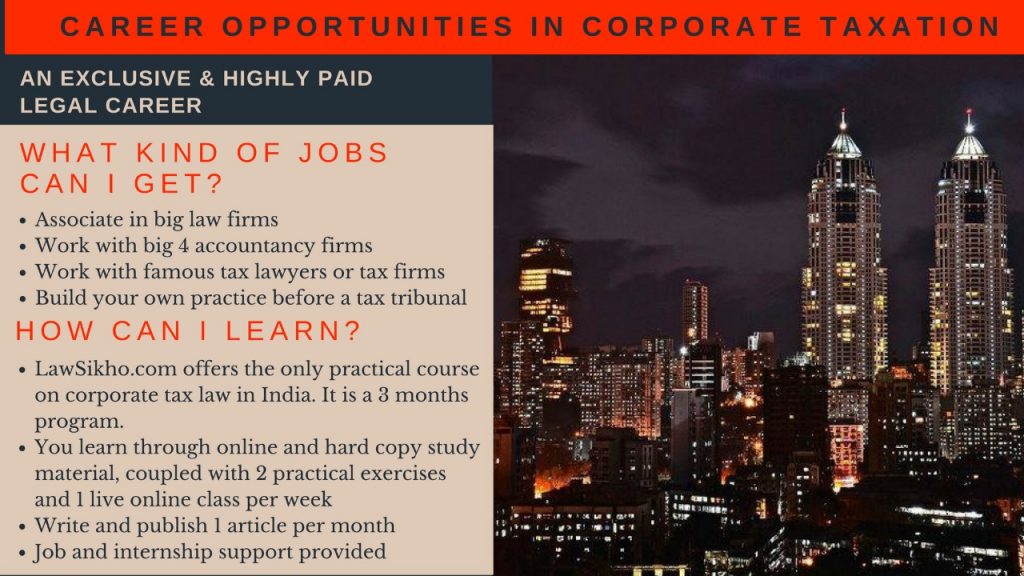This article is written by Abhyuday Agarwal, COO, iPleaders
The introduction of the Black Money (Undisclosed Foreign Income and Assets) and Imposition of Tax Act, 2015 to tackle the black money menace has opened up a plethora of opportunities for CAs, CS, Lawyers and Consultants. The intention has been to free up funds which are stashed away in secret accounts and have them back in circulation in the Indian economy, after imposing a financial cost on the taxpayer.
What does this mean for you if you are an accountant, Company Secretary or a lawyer? As a professional, the ability to upgrade the range of services and your depth of knowledge is very important. From time to time, new statutes and regulatory instruments are issued which impose new kinds of obligations on Chartered Accountants, Company Secretaries and lawyers. You will realize that as your practice matures, you will constantly be required to advise on subjects which beyond the scope of what you studied when you acquired your CA, CS or law degree.
There are many professionals in the market who do not go beyond the regular income tax and TDS filing and audit work and therefore do not stay updated with such developments. They are unable to explore the full potential of their practice.
On the other extreme are those professionals who possess the knowledge, but are unable to utilize it to their advantage because they depend on promoters to provide them clear and express instructions on the work to be done. They consider that they are to perform work only as per the client’s instructions. However, that is not what businessmen need.
In today’s day and age, professionals are not only required to possess knowledge and skills required to perform the work, but they must be willing to ask appropriate probing questions to discover and inquire into the possible kinds of work that a client may require. The client may come to you with X fact situation and Y instruction, but you may be required to identify and guide the client that A, B and C are also required to be done. In addition, you may be required to provide a roadmap and an estimate of the cost and the client’s resources which are required. You may need to explain the consequences of not performing these actions, so that the client is able to take an informed decision. After that, the client may confirm or decline which tasks need to be performed, and you can proceed accordingly. This ability to inquire and generate work makes a huge difference in their earning potential and the level of income they generate.
Let’s take an example here – in light of the above legal development, you need to know what opportunities are available to Chartered Accountants, Company Secretaries, lawyers, advisors and consultants. What inputs they can provide clients in connection with the Black Money (Undisclosed Foreign Income and Assets) and Imposition of Tax Act, 2015?
Regulatory litigation
Taxpayers may require the following regulatory and litigation work in connection with Black Money (Undisclosed Foreign Income and Assets) and Imposition of Tax Act, 2015:
- Responding to notices issued against your client for assessment and reassessment made under Section 10 of the Black Money Act
- Filing of appeals provided under following provisions of the Black Money Act :
- Section 15 for objecting amount of tax, liability, penalty or specific orders (as mentioned) passed by the AO to the Commissioner (Appeals)
- Section 18 from an order of Commissioner (Appeals) to the Appellate Tribunal
- Section 19 from an order of Appellate Tribunal to the High Court
- Section 21 from a judgment of High Court to the Supreme Court of India
- Filing of revision under Section 24 to the Principal Commissioner or the Commissioner
- Filing of Writ Petition under Article 226 against different kinds of decisions of the tribunal or tax authorities
The forms for appeal to the Commissioner (Appeals) and the Appellate Tribunal have been provided under the Rules made under the Act (find here) as Form 2 and 3 respectively.
In general, a Company Secretary, Chartered Accountant or lawyer are all equally equipped to spearhead work in the above proceedings for a client (with the involvement of other professionals), if the client instructs and if the professional possesses the knowledge and skill-set to perform it. There may be specific aspects of the work that require a professional with a particular qualification only to perform the work. For example, a valuation task may require a Chartered Accountant to perform the valuation and an advocate may be needed to argue a writ petition. In fact, accountants can represent a client in various kinds of regulatory proceedings before income tax authorities. Involvement of all professionals will be required at different aspects of these proceedings.
Although this is regular litigation work, professionals who are not aware of the Black Money law will not be able to anticipate the work and face difficulty in obtaining client mandates.
Compliance tasks
Enabling a taxpayer to become compliant with a new law opens up a huge array of compliance work for professionals. Although no separate return is required to be filed under the Black Money Act, complying with the new law is essential to avoid penalties and prosecution under the stringent provisions. Compliance work includes:
- Salary taxation and reporting which would include source reconciliation of foreign assets and advisory services on impact areas
- Reporting in tax returns of foreign assets under Schedule of Foreign Assets as provided in all Forms of filing ITR
These compliance requirements can be performed by a Chartered Accountant or Company Secretary. Collaboration with an in-house lawyer and inputs from promoters will be necessary to ensure this work is done completely.
Also, promoters’ inputs here are often necessary as they have a 360 degree perspective of their business. In comparison, an external consultant may not always identify the need to make a filing, although the cost of not making a necessary filing can fall on the promoters later.
Strategic advice and inputs
Do you want to know how you can enhance the value of your compliance inputs from a client’s perspective? How can you charge more for your services? You can stop depending on express instructions from clients and start including compliance tasks as a component of strategic advice. Compliance is more valuable as a part of a strategic solution than as an individual task, as the task itself primarily involves filling up and submission of various forms.
How do you give such strategic advice? If you are a compliance professional (Chartered Accountant or Company Secretary), don’t expect people to come to you with specific mandates to perform compliance under this Act, as many people are not aware of the intricacies of the law. You need to instead ask inquiring questions (without sounding like you are making a promoter’s life difficult) to identify whether a something needs to be disclosed to comply with the law. If you find information which needs disclosure legally, advise the promoters, get a go-ahead to regularize any violation or irregularity and go ahead and complete the compliance task.
Strategic advice can be given to rectify some defect, or it can be given before a specific transaction is undertaken. Sometimes, after performing a task for the moment, such as filling a return disclosing foreign assets, you might decide to set up a new method of working with the client so that the manner of undertaking certain transactions in future is different. If you take this additional step to think ahead (and literally think for a client), your value for the client will be much higher than somebody else with the same level of knowledge, who does not do this. Clients want professionals whom they can trust that they will get the work done.
If you are a strategic advisor, you will be involved with your client with the entire process, including the regulatory litigation part, even if you do not represent your clients in such litigation.
How can you use this knowledge to enhance your professional growth?
How can you use this knowledge to increase your professional growth? There are a few elements you need to keep in mind for your growth as a professional or to grow your practice:

- Knowledge of black money law (covered in the course), type of work you may be required to perform with respect to the law (covered here and in the course) and have the willingness to perform such work (comes from your own initiative)
- Ask questions to inquire and obtain information from a client to identify the kinds of work necessary to be performed, any aspects that may have been missed by a client or confirm that nothing is missed
- Set up preventive strategies for the future (where necessary), so that the client does not fall in the same situation again or is better equipped to navigate it if he or she does. Don’t worry, enlightening your client will not lead to yours losing future work – on the contrary, you will be surprised at how much more work is handed over to you pertaining to several other kinds of legal issues. In fact, that is how the big law firms have become ‘full-service’ – they started assisting some clients with a specific kind of work. When the clients liked and trusted their work and grew their business, they gave them work pertaining to all kinds of areas, so the law firms had to build capacity internally to perform all those kinds of work.
- Assist clients in building systems so that such steps are not missed out in future – don’t wait to set for the CEO’s or MD’s time alone to do this. You can simply do this with the CFO or the in-house general counsel, depending on who’s best positioned inside the company to look at this.
This is the level of content you can learn only from lawsikho.com courses. Law schools or any other course providers fall far short of this level. If you want to check out our advance courses, consider enrolling in one of the following courses starting in the new year.
Diploma
- Diploma in Industrial and Labour Laws
- Diploma in Companies Act, Corporate Governance and SEBI Regulations
Executive Certificate Courses
- LawSikho Executive Certificate Course in Real Estate Laws
- LawSikho Executive Certificate Course in Arbitration: Strategy, Procedure and Drafting
 Serato DJ Crack 2025Serato DJ PRO Crack
Serato DJ Crack 2025Serato DJ PRO Crack









 Allow notifications
Allow notifications


